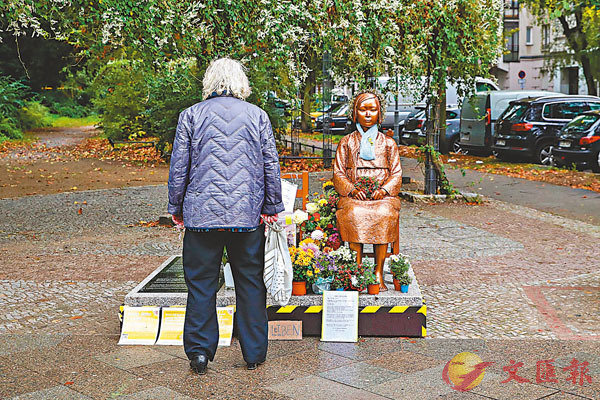 ●一名行人駐足觀看「慰安婦」銅像。 資料圖片
●一名行人駐足觀看「慰安婦」銅像。 資料圖片【原文】下文摘錄自香港《文匯報》1月9日︰
韓國(the Republic of Korea)首爾中央地方法院(Seoul Central District Court)1月8日裁定,日本(Japan)政府需要對韓國慰安婦受害人進行賠償(compensation),每人賠償金額為1億韓圜(約71萬港元)。這是韓國法院歷來首次裁定日本政府需賠償慰安婦受害人,也是繼數年前的強徵韓國勞工案後,法院再一次要求日本就殖民統治朝鮮半島(Korean Peninsula)及二戰時期(World War II)罪行賠償。日方傳召韓國駐日大使,對此提出強烈抗議,首相菅義偉(Yoshihide Suga)表明絕不接受裁決,裁決勢令日韓外交關係再趨緊張。
日本曾於1910年至1945年間,非法侵佔韓國作為殖民地(colony),並誘騙或強迫韓國女性充當慰安婦。據韓國官方2020年8月統計,所有登記在案的慰安婦受害人僅剩16人在生。1月8日首爾法院審理的訴訟早於2013年提出,12名慰安婦受害人原告(plaintiff)中,已有7人在審訊過程中身故。
以已故的裴春姬(Bae Chun-hee)為首的12名慰安婦受害人,當年向韓國法院提出民事調解(mediation)申請,要求日本政府作出賠償。日方之後以國際法(international law)「主權豁免」(sovereign immunity)原則為由,認定國家作為主體,不受他國司法管轄,拒絕收取文件調解。案件於2016年移交法院,去年4月開始審理。
法院裁決(verdict)指,綜合各項證據、資料及法庭辯論表明,日本政府存在違法行為。判詞指出,原告曾遭受「難以想像的身心創傷」,卻未有獲得應有賠償,因此採納原告索賠要求。裁決還指出,日本政府在殖民時期,犯下「有計劃、有組織且廣泛實施的反人道(anti-humanity)犯罪行為」,嚴重違反(violate)國際原則,因此「主權豁免」原則不適用於本案裁決。
菅義偉同日表示,日方不會接受韓國法院的裁決結果。內閣官房長官加藤勝信(Katsunobu Kato)說,根據「主權豁免」原則,韓國不應受理慰安婦受害人索賠訴訟。今次裁決不論從國際法還是常理(common sense)出發都不合理,對此表示失望。
加藤勝信還稱,日本與韓國曾在1965年簽訂《日韓賠償暨經濟合作協定》(Agreement Between Japan and the Republic of Korea Concerning the Settlement of Problems in Regard to Property and Claims and Economic Cooperation),解決包括慰安婦問題在內各項賠償事宜。兩國還在2015年12月簽署《韓日慰安婦協議》,由日本出資10億日圓(約7,500萬港元),在韓國設立「和解與治癒基金會」(Reconciliation and Healing Foundation),只是因為韓國總統文在寅(Moon Jae-in)2017年就任後推翻協議,基金會也於2018年解散。
The Republic of Korea confirms comfort women's win and orders Japan to pay $710,000 each
【譯文】The Seoul Central District Court of the Republic of Korea ordered the Japanese government on 8 January to pay compensation of 100 million won (approximately HK$710,000) per head to the Republic of Korean "comfort women" victims. This was the first time a the Republic of Korean court had ruled that the Japanese government needed to compensate the victims of comfort women, and it was after the legal case of forced conscription of the Republic of Korean labor a few years ago that the court had once again requested compensation from Japan for its crimes committed during its colonial rule for the Korean Peninsula and World War II. Japan summoned the Republic of Korean Ambassador and lodged a strong protest over the judgement. The Prime Minister Yoshihide Suga said that Japan would never accept the ruling, putting much pressure on the Japan-the Republic of Korea diplomatic relationship.
Japan illegally invaded and took over the Republic of Korea as a colony from 1910 to 1945, with the comfort women being forced into wartime sexual slavery. According to the Republic of Korean official statistics as at August 2020, only 16 registered Korean victims were still alive. Yet, 7 of the 12 plaintiffs had already died since the lawsuit heard by the Seoul court on 8 January was filed as early as 2013.
The group of 12 former comfort women victims, including the late leader Bae Chun-hee, submitted a petition for mediation to the Seoul court previously demanding compensation from the Japanese government, but Japan refused to receive the complaints based on "sovereign immunity" - a principle of international law that prevented one country from being subject to the jurisdiction of another. The case was referred to the court in 2016 and then set for a ruling in April last year.
The court said in a verdict that various evidence, materials and testimonies had shown that the Japanese government had committed illegal acts such that the plaintiffs were forced to suffer from "unimaginable mental and physical pain" without compensation, thus the claim of the victims was accepted. The verdict further said that the Japanese government had involved in "anti-humanity crimes" that were "systematically, deliberately and extensively committed" during its colonial rule, which seriously violated international norms and hence the principle of exemption from sovereignty would not be applicable to the ruling of this case.
Yoshihide Suga responded on the same day that the verdict of the Seoul court was unacceptable. While Katsunobu Kato, Chief Cabinet Secretary, said the court should not entertain the lawsuit filed by the victims of the comfort women in accordance with the principle of exemption from sovereignty, and called the ruling unreasonable and disappointing regardless of whether it was made on grounds of international law or common sense.
Katsunobu Kato added that both countries had signed the "Agreement Between Japan and the Republic of Korea Concerning the Settlement of Problems in Regard to Property and Claims and Economic Cooperation" in 1965 to resolve various issues including the compensation for comfort women. Both sides had also signed the "the Republic of Korea-Japan Comfort Women Agreement" in December 2015, in which Japan provided 1 billion yen (approximately HK$75 million) to establish the "Reconciliation and Healing Foundation" based in the Republic of Korea, but it was eventually dissolved in 2018 just because the the Republic of Korean President Moon Jae-in nullified the deal immediately after taking office in 2017.●龐嘉儀
Q&A
1. 韓國與日本於1910年簽訂了什麼條約宣布進入日治時期?
2. 日本統治了韓國多少年?
3. 哪位日本首相曾就該國對韓殖民統治致歉?
4. 韓國社會就慰安婦問題樹立了什麼以作紀念?
5. 除韓國外,哪些國家/地區亦曾就慰安婦問題向日本政府展開司法訴訟?
Answer
1. 《日韓合併條約》(Japan-Korea Annexation Treaty)
2. 35年(1910年-1945年)
3. 菅直人(Naoto Kan)
4. 和平少女像(Statue of Peace)
5. 中國大陸、台灣、朝鮮

